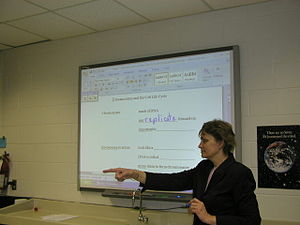
Image via Wikipedia
The Ninth Circuit Court of Appeals in Renee v. Duncan recently declined to invalidate a regulation under the federal No Child Left Behind Act that allows teachers participating in alternative routes to certification (licensure) to be considered "highly qualified." Under NCLB, a highly qualified teacher "has obtained full state certification as a teacher (including certification obtained through alternative routes) or passed the state teacher licensing examination, and holds a license to teach in such state."
Some California plaintiffs alleged that they have been harmed by the challenged federal regulation because the state has allowed school districts to hire alternative route participants who are not as competent as those traditionally prepared through university programs. In California, teachers in internships receive support and training while they advance toward state certification. Plaintiffs in Renee argued that if the federal alternative route regulation were invalidated, California would stop considering participants in internship programs to be highly qualified. They also contended that alternative route teachers are hired mainly in school districts with high concentrations of low-income and minority students.
The Ninth Circuit held that since California still could consider teachers participating in alternative licensure routes to be highly qualified even if the federal rule were struck down, a judicial declaration invalidating the NCLB regulation would not provide the redress sought. In short, since certification is a matter of state law, California could alter its definition of "highly qualified" regardless of what the federal government does.
The Renee plaintiffs claimed that California followed the federal lead in changing its requirements for licensure after NCLB was enacted and that the state would do so again if the federal regulation were dropped. But only the dissenting Ninth Circuit judge endorsed this position. He reasoned that since California modeled its definition of highly qualified on the NCLB, invalidating the federal regulation would have an impact on the hiring and assignment of teachers licensed through alternative routes in California.
No one contests the NCLB goal of having highly qualified teachers or disagrees that teacher quality is one of the most important factors in improving the achievement of all students. The controversy focuses on how to ensure that there is a highly qualified teacher in every classroom.
Research is not yet available to refute or support the claim that teachers licensed through alternative routes lack instructional skills and are not getting sufficient preparation in pedagogy. Those making these claims need to present data to convince policy makers that traditional certification through university preparation programs produces better teachers. In the absence of such data, alternatives to traditional licensure for teachers and school leaders will continue to be considered and likely adopted in an increasing number of states.




